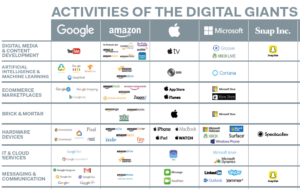
Facebook’s new video service can’t compete with YouTube
Google (goog) started out as a search company, Facebook (fb) a social media company, Amazon (amzn) an e-commerce company, and Tencent a messaging company. But these distinctions are becoming less relevant every day.
Facebook’s announcement of a new video service called Watch to compete with YouTube and Netflix (nflx) did not come as a surprise to many. The company has been building up its video offerings and capabilities for some time.
In fact, over the past few years, we have seen wave after wave of new product and service announcements, not just from Facebook, but from all of the digital giants. The days of being able to clearly differentiate one giant from another by what they offer are fast disappearing.
Digital giants like Google, Amazon, Facebook, Apple (aapl), and Microsoft (msft) now compete against each other in up to 11 business areas, including content development, artificial intelligence, e-commerce marketplaces, hardware devices, messaging, financial services, and advertising. There isn’t a single business area left where they are on their own.

The same situation is happening is China. Alibaba (baba) was traditionally focused on e-commerce, and Tencent on gaming and messaging. Both companies grew massively, but for a while in parallel, rarely intersecting. Today, however, they are competing across many categories.
The laggard in this converging battleground is Snap, perhaps due to the fact that it is newer and smaller than the other giants. One might wonder whether this lack of scope puts Snap (snap) in a relatively vulnerable position compared to its better-diversified competitors.
One implication of the increased competition among digital giants is clear: Consumers will benefit, at least in the short term. Innovation will increase and prices will fall, often to zero, as these giants subsidize new products and services—with profits from more established ones.
It will also lead to significant overlap and redundancy. In the winner-take-most world of ecosystems and platforms, there won’t be room for unlimited choices, thus we are very likely to see consolidation. The number of products and services may rise in the short term, but it is likely to drop in the longer term, as dominant players squeeze out less successful competitors in each sub-area, leaving consumers with fewer choices long term.
Who will win? That’s hard to say, but I believe the more diversified the revenue base, the better. Thus, Snap, Facebook, Google, Alibaba, and Apple, all with the vast majority of their revenues coming from single lines of business, look more vulnerable than Microsoft, Amazon, and Tencent, whose revenues and profits are spread out more evenly across multiple sources. Diversity protects against competitive, technological, or economic shocks.
These giants are playing it smart—diversifying their activities in search of growth, loyalty, and spreading their risk. However, they can’t all win in every segment they enter, and we are going to see a lot of jostling for position in the near future.
Will Facebook’s new Watch service displace YouTube as the top Internet video service? Unlikely. But will YouTube continue to dominate this area as it has for the last few years? Also unlikely. As the digital giants each move from a dominant service to a portfolio of tens or even hundreds of products and services, we are going to see a significant muddying of the digital waters.
Michael Wade is director of the Global Center for Digital Business Transformation at IMD, and co-author of Digital Vortex: How Today’s Market Leaders Can Beat Disruptive Competitors at Their Own Game.
Research Information & Knowledge Hub for additional information on IMD publications

Business leaders at this year's World Economic Forum sought to block out the political noise and focus on what's happening in the real economy.
The China Resources Beer (CR Beer) case study is a compelling narrative of the world’s largest beer producer by volume under the leadership of CEO Hou Xiaohai. In 2016 CR Beer embarked on a pivotal transformation journey. This case study offers cr...
Five friends created DIDA in 1983 and turned it into a global provider of IT infrastructure and services. Riding the wave of rapid growth of communication networks and increasingly global business relationships of corporations, DIDA established it...

Companies that excel in both digital and sustainable transformation attract a stock market premium – but how do you tap into that value? Here’s a five-step guide to outperforming your competitors.

Gamification projects can result in very different outcomes, depending on which features are included – and which are left out. Here are five tips for success and two mistakes to avoid.

Many new businesses have emerged in recent years with few employees, no roots in the community, and heavily reliant on Big Tech for survival. How does this square with the demands for responsible leadership?
In June 2024, at the CocoaCrafters Operating Centre, Elena Fever faced a crucial meeting with the board of directors. The discussion surrounded how to integrate Generative AI (GenAI) into the company’s supply chain strategy to enhance forecasting ...

With fact-checking out and community-driven moderation in, Meta is betting big on free speech – but critics warn the move could open the floodgates for disinformation and online harm.
When the dotcom bubble burst in March 2000, this did not stop the world from going digital, but it did poke holes in the concept of trust, especially in the digital world. David Goldenberg, a Belgian entrepreneur with extensive experience in manag...
China has set a bold objective to become the global leader in AI by 2030. By 2030, AI could potentially add $600 billion to China's economy annually. The country hosted over 4,500 AI companies in 2024, representing 15% of the global total. China i...
in I by IMD 24 January 2025
Research Information & Knowledge Hub for additional information on IMD publications
Research Information & Knowledge Hub for additional information on IMD publications
Research Information & Knowledge Hub for additional information on IMD publications
NTT Corporation, Japan’s information and communication technologies (ICT) leader since 1953, was the first to commercialize internet usage on mobile phones in the 1990s, which resulted in NTT achieving much success in Japan. However, by the end of...
Building on NTT (A), the case starts with NTT’s CEO having narrowed down strategic growth options with the board to prepare NTT for the future. Past international investments in AT&T Wireless and KPN to tap into foreign markets had resulted in bil...
Research Information & Knowledge Hub for additional information on IMD publications
in I by IMD Brain Circuits 15 January 2025
Research Information & Knowledge Hub for additional information on IMD publications
in I by IMD 14 January 2025
Research Information & Knowledge Hub for additional information on IMD publications
Case reference: IMD-7-2593 ©2024
Research Information & Knowledge Hub for additional information on IMD publications
Research Information & Knowledge Hub for additional information on IMD publications
Case reference: IMD-7-2611 ©2024
Research Information & Knowledge Hub for additional information on IMD publications
Research Information & Knowledge Hub for additional information on IMD publications



